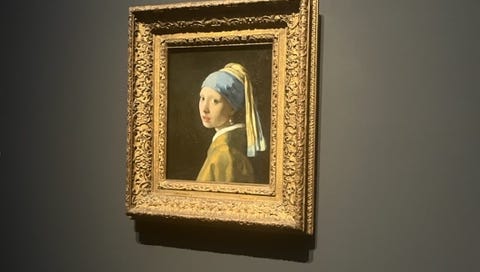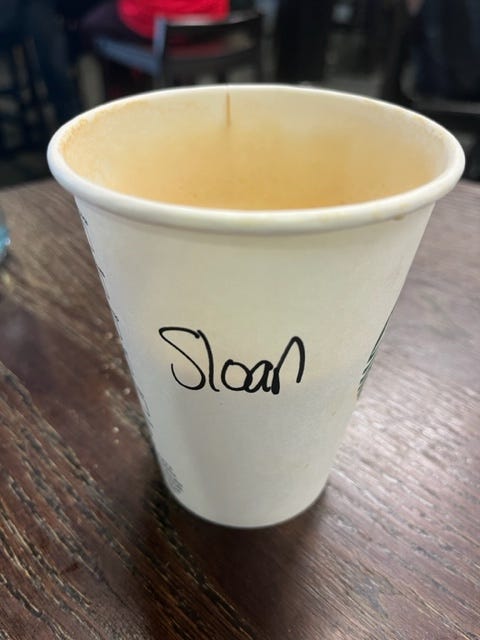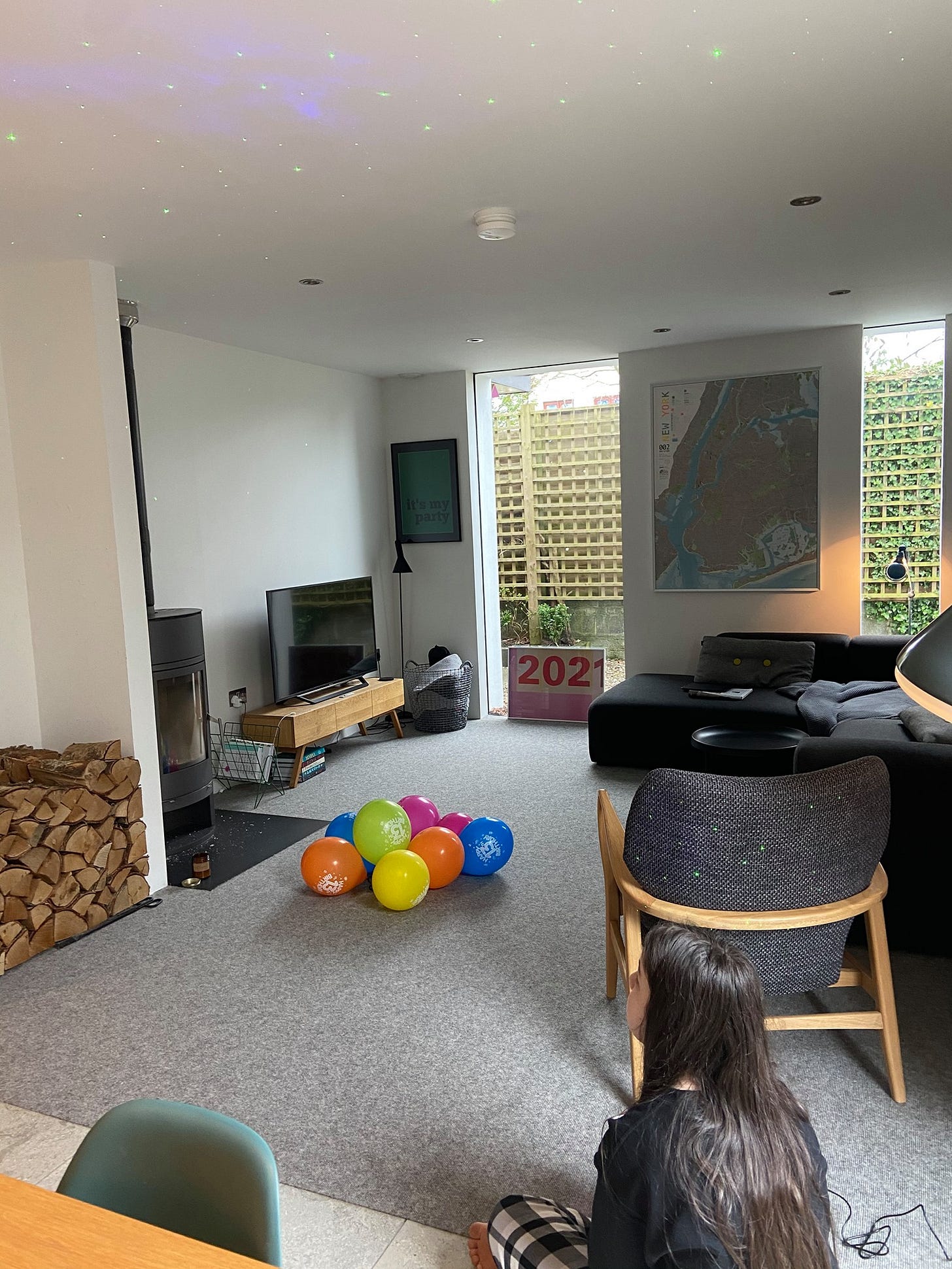Ella, Girl With A Pearl Earring and Dealing With Pandemic Loss
When I laughed ever-so-slightly-too-enthusiastically at the man’s joke about the King of the Netherlands debuting on TikTok, I reckoned I’d done it again. Her nostrils had flared. There’d been a look. The body language screamed teenage disgust - the folded arms, the stance. It was Sunday morning, Mother’s Day. We were on a two-hour walking tour of The Hague. Most of the guide’s stories had been about him, what he did, where he came from, his messy ancestry, his sideline as a stand-up comedian. We’d learned more about the rest of Europe than the country we were standing in. “The Dutch don’t do much,” he said. Everything was coated in bland. The sky was oppressively overcast. “It’s very dull here,” he said. There were no scandals in the Royal Family. Most of them were called Willem. A train had been hijacked in 1977. He’d recommended we eat in a Thai restaurant. As a nation, the Dutch tended to avoid conflict, only taking sides when attacked. It seemed like a good way to be.
Before we’d even left the airport, when we were still in that holding space between home and away, fixated on a screen, waiting to make a sudden sprint to the gate, it was my latte that embarrassed her first. “Sloan,” I said to the woman with the marker pen. Ella’s eyes flashed in horror. “Why did you give your surname?” she said. After that, the incidents piled up - when I couldn’t understand the receptionist and answered a question she hadn’t asked, when I’d tried to start a conversation with the moody student from the Basque region, when I’d accidentally booked us on to an Amsterdam booze cruise with a group who seemed fresh from trying the local delicacy. “Dark and stormy or gin and tonic?” I asked her. She’d bitten her finger until it bled when the steward1 pouring the drinks asked us to introduce ourselves. She had averted her eyes when the tipsy lady attempted to clamber out of the boat when it was still at least six feet from docking, when the heavens opened and the Irish girl distributing umbrellas, was also tipping her wine into one of them. She’d heard a series of innuendos about houseboats, was learning how to smuggle cannabis. She had endured a number of humiliations. When our Trainline tickets refused to scan, we’d been trapped repeatedly behind barriers, resorted to flagging down passing staff, using hand gestures to explain our predicament. She had begged me not to make it sound like a complaint when I said I was demanding a quieter hotel room. She wasn’t sympathetic when I explained I’d heard horses clip-clopping on the cobbles at 4am2. I wondered was this trip achieving what it was supposed to.
I’d wanted to make it up to her. I’d become convinced that of all my children, she was the one who had suffered most during the pandemic. On Mother’s Day, 22 March 2020, when Boris addressed the nation and told us that there would be no visits, no flowers, no meals, that the single best present we could give those who had given us life was to spare them the risk of catching a very dangerous disease, it was Ella’s twelfth birthday. “We have closed the schools, the pubs, the bars, the restaurants, the gyms,” he said.
I think of that day as the beginning of the end of Ella’s childhood. I remember how her hopes gradually and cruelly slipped away, the week leading up to it, the decisions we didn’t have to make as venues called to cancel, as we scrambled to make alternative plans. We did our best, embraced the novelty. She was stoic, her hair piled up in a bun. She’d eat a huge fry for breakfast, something that would become an annual tradition. I’d share endless photos on Facebook, big up the gratitude and the positivity. She was wearing the oodie she would spend the next three months living in. One year later, the novelty had worn off. I would capture her turning thirteen, sitting alone on the living room floor, aiming her star projector at the ceiling, surrounded by balloons her grandparents had deposited from a safe distance away. Her sisters were briefly back in their classrooms, her schooling stage not deemed important enough to return. By 22 March 2022, her enthusiasm for birthdays was gone, her attitude to celebration changed forever. It was possible to do something with her friends again. She didn’t want to.
As the third anniversary of the official pandemic start-date approached, I read a post. It was about the impact of lockdown. The writer was anxious sharing what she felt she’d lost. “By bringing it up, I’m breaking some sort of unspoken code that we’ve all begun to abide by. We’re not meant to talk about it. It happened, it was horrible, move on3”. She felt she didn’t deserve to mourn, she hadn’t lost anyone and nothing could compare to the human tragedy, 335 lives on 22 March 2020, more than 200,000 by 22 March 2023. She referenced the study that found that the mental health crisis from Covid was minimal4, as if it was a fantasy world of banana bread and Zoom quizzes and Joe Wicks and we’re all back to normal now. I wept as I replied, as I typed how much I’d struggled with the disruption to Ella’s birthday, how I was desperate to make that loss up to her but I couldn’t. “That time is gone,” I said. Others joined in, talked about their lost experiences, missed milestones, the memories they didn’t have. I was deeply moved by the woman who felt a wave of grief as she stood at the bus stop outside the Apple Store on Regent Street and remembered how she used to stand there twice a week after teaching yoga at a studio nearby, now gone, yet another casualty of the financial fallout. Between us, we assured her that all loss matters, that like sin, there is no hierarchy, that we need to be allowed to individually grieve, that there desperately needs to be places where we can collectively grieve, that things aren’t fine.
As we’d sat in Starbucks and I’d drunk from the compostable cup with my surname on it, I wasn’t sure if my expectations were too high, if I wanted there to be complete healing, a sense of closure from this trip, a release from the guilt of feeling responsible for something I couldn’t control. We’d break the cycle, make her fifteenth memorable. She’d get her love of birthdays back. We’d see some art, perfect the art critics’ pose, discuss texture and shading. I’d embarrass her everywhere. She would take Snapchats of me pretending to admire a large landscape, I’d get told off by the curator for leaning too close to the view of Delft. At the sold-out, once-in-a-lifetime Rijksmuseum exhibition where critics were calling in long-standing favours to secure tickets, we would mainly end up stuck behind other people. We’d miss Girl with a Pearl Earring, have to go back round past the still lifes and the outdoor scenes from the seventeenth century, do a second loop. When we found her, she was tiny. It was no wonder we’d missed her. I tried not to dwell on the symbolism, the fact that we can’t go back, make a second loop in life, that the Ella now is not the Ella that was, that she would have grown up anyway, that she has chosen not to love birthdays. Later, the guide who was also a stand-up comedian would explain the pearl wasn’t even a pearl. It was just an imitation glass bauble, two quick strokes of Vermeer’s paintbrush, an add-on. It was never meant to matter that much. We’re meant to focus on her eyes.
“You're so calm and quiet, you never say. But there are things inside you. I see them sometimes, hiding in your eyes5”.
Three years on, let’s not hide it all inside, behind our eyes. Let’s talk about what we’ve lost, individually, collectively because all of it matters.
This is overstating him. He may have had a couple of Dark and Stormys too.
I promise I hadn’t been anywhere near a coffee shop.
Tracy Chevalier Girl with a Pearl Earring






